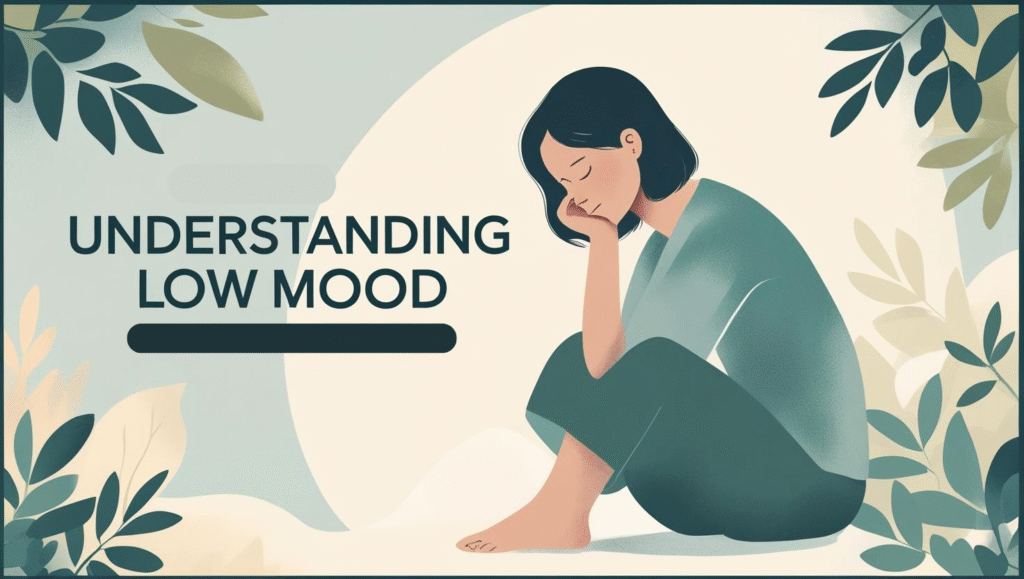“Low Mood: Simple Steps to overcome “

Understanding Low Mood: Causes, Effects, and Strategies for Improvement
Low mood is a common emotional state characterized by a persistent feeling of sadness, lack of energy, and disinterest in activities that a person usually enjoys. While it is generally less severe and shorter in duration than clinical depression, it can still significantly impact daily life and well-being. It’s important to understand the nuances of low mood, its potential triggers, and strategies for managing it effectively.
Identifying Low Mood
Low mood can manifest in many ways, including:
- Emotional Symptoms: Persistent sadness, irritability, or feeling overwhelmed.
- Physical Symptoms: Fatigue, changes in appetite, or sleep disturbances.
- Cognitive Symptoms: Difficulty concentrating, indecisiveness, or negative thinking patterns.
- Behavioral Symptoms: Withdrawal from social activities, loss of interest in hobbies, or decreased productivity.
Understanding these symptoms can help individuals identify when they are experiencing low mood and take proactive steps to address it.
Causes of Low Mood
Low mood can be triggered by a variety of factors, often interacting with each other. Some common causes include:
1. Stress
Stress is a significant contributor to low mood. Whether it’s due to work pressures, relationship difficulties, or financial problems, stress can lead to feelings of being overwhelmed and emotionally drained.
2. Life Changes
Major life transitions, such as moving to a new city, changing jobs, or experiencing a breakup, can disrupt emotional stability and lead to a temporary low mood.
3. Lack of Sleep
Sleep is crucial for emotional regulation. Poor sleep quality or insufficient sleep can exacerbate feelings of sadness and fatigue, making it difficult to cope with daily challenges.
4. Poor Diet
Nutrition plays a vital role in mood regulation. Diets lacking essential nutrients, such as omega-3 fatty acids, vitamins, and minerals, can negatively impact mood and energy levels.
5. Seasonal Changes
Seasonal Affective Disorder (SAD) is a type of depression related to changes in seasons. The reduction in daylight during the winter months can lead to low mood in some individuals.
The Impact of Low Mood on Daily Life
Even though low mood is typically temporary, it can have a tangible impact on various aspects of life:
Personal Relationships
Low mood can lead to withdrawal from social interactions, causing strain on personal relationships. Friends and family may misinterpret this withdrawal as disinterest or hostility, leading to misunderstandings.
Professional Life
A persistent low mood can reduce motivation and productivity at work. It may also affect an individual’s ability to concentrate or make decisions, potentially impacting job performance.
Physical Health
Chronic low mood can lead to neglect of physical health, including poor dietary choices and lack of exercise, which can, in turn, exacerbate feelings of fatigue and sadness.
Strategies for Managing Low Mood
While low mood can be disruptive, there are several strategies individuals can employ to manage and improve their emotional state:
1. Establish a Routine
Creating a daily routine can provide structure and a sense of normalcy. This can help stabilize mood and provide a framework for incorporating healthy habits.
2. Prioritize Sleep
Improving sleep hygiene, such as maintaining a regular sleep schedule, creating a restful environment, and limiting screen time before bed, can enhance mood and energy levels.
3. Engage in Physical Activity
Regular exercise releases endorphins, which are natural mood lifters. Even moderate activities like walking or yoga can be beneficial for mental health.
4. Practice Mindfulness
Mindfulness practices, such as meditation and deep breathing exercises, can help individuals stay present and manage stress more effectively.
5. Connect with Others
Maintaining social connections is crucial for emotional well-being. Reaching out to friends or family for support or engaging in community activities can mitigate feelings of isolation.
6. Seek Professional Help
If low mood persists or significantly impacts daily life, it may be beneficial to consult a mental health professional. Therapy or counseling can provide additional support and strategies for managing low mood.
The Importance of Self-Compassion
When experiencing low mood, it’s essential to practice self-compassion. Acknowledge that it’s okay to feel sad or fatigued and that these feelings are part of the human experience. Treat yourself with kindness and patience, just as you would support a friend in a similar situation.
Conclusion
Low mood, while often temporary and less severe than clinical depression, can still disrupt daily life significantly. By understanding its causes and effects, individuals can take proactive steps to manage their mood through lifestyle changes, support systems, and professional help if needed. Remember, it’s important to prioritize mental health and seek support when necessary, ensuring that low mood does not become a barrier to a fulfilling life.
If you want full information please read our E-BOOk. if you want online consultantion , then contact me. online consulotation is almost free.